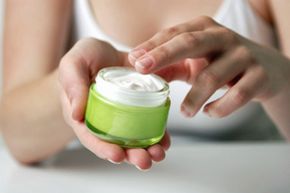No man or woman on the face of the Earth is the same. Whether it's height, weight, eye or hair color, or skin tone, humans are distinctly different. Each person's needs are individual, too. When it comes to skin care, moisturizers help replenish your skin's natural lipids and fatty substances [source: WebMD]. But does applying too much moisturizer have any adverse effects for your skin?
There's no empirical data definitively supporting such a claim. But applying moisturizer can adversely affect your skin's normal functions if applied under the wrong conditions. It's important to understand your skin is a living, breathing organ. In fact, it is the largest organ in the human body [source: U.S. News]. Just like the other organs in your body, your skin's functions can be disturbed, causing irregularities to its normal biological behavior.
Advertisement
When you lay in bed, your skin works harder than it does during the day to rejuvenate itself [source: Prevention]. Some physicians feel that the nighttime is a good opportunity to apply moisturizer, especially to seal in moisture after a bath. In fact while you're wearing your sleepwear, you might take advantage of thicker varieties that could cause your finer dress clothing to stick to your skin.
But some proponents of natural skin care solutions argue that applying a moisturizer at night can disrupt your skin's natural cycle and make your skin even more dry [source: Dr. Hauschka Skin Care].
On the next page, we'll take a look at what happens when you don't apply the correct type of moisturizer at the correct time. As you'll see, it's more a question of the way you apply moisturizer than the amount you use.
Advertisement

